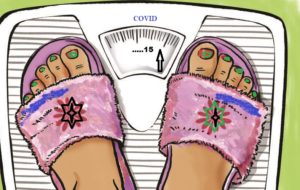Ilana Katz MS, RD CSSD
I recently revisited a movie “Sleeper” (Woody Allen) since there was something interesting in the concept about a man waking up after a 200 year sleep. Recommendations for weight loss looks very different in that 200 year gap. On awakening, the sleeper finds that not only are deep fried foods good for weight loss, they are also considered healthy. An AHA moment. perhaps? Are we in a movie? Covid may make it feel this way, but weight-loss these days has a movie-like feel to it too, right? Could Woody Allen have been onto something? (or not?)
Are you one of those feeling so confused about using keto for weight-loss? What is real science versus pseudo-science? In my field of work, it is not surprising that the average person is feeling failed by doctor’s not being able to hone in on the solution. It is unfortunate that nutrition is an area of so much misinformation which can make a huge difference to an individuals’ health and body composition goals.
A current weight-loss trend is very limited carbs (high protein and fat) and we all know someone who claims to be a poster child for ketogenesis, even boasting about lab work numbers being in normal limits. That sounds positive right? Well, throwing a spoke in that wheel – it may not be as good as all that… you can also lose weight with Adderall and Phenetamine and get lab work normalized (for a few weeks) – this does not mean it is healthy.
Interestingly enough, the high protein diets that advise on limited carbs do have some science that makes sense, and this can be enticing for both weight-loss and health (and hereforth are some points to consider):
The average diet IS TOO HIGH in carbohydrates
Analyzing the TYPE of carbs: yes, absolutely elimination of simple sugars, processed flours and grains (where most of the fiber and nutrition has been removed ) will evoke best results. What most of these have in common is their rate of absorption into the bloodstream promoting insulin to accelerate the conversion of calories to fat. So of course there is a benefit of removing the inappropriate carbohydrates, but to replace them with unhealthy sources of protein and fat, so that insulin response is blunted, may be dangerous solution for many.
Reducing simple carbohydrates works, and replacing them with fibrous, nutrition-dense foods such as unprocessed grains, fruit, vegetables, and legumes rather than saturated fatty meats and fats works for weight loss. Firstly, fiber can make one feel fuller and prevent over-eating. Secondly these whole food options contain more nutrients and anti-oxidants for metabolic pathways working more effectively, with the added benefit of reducing risk of heart disease in the long term and with anti-cancer and anti-aging substances to boot.
Physiologically – fat as brain fuel reduces fat mass
Using stored fat can certainly reduce body mass. Furthermore, the lab work related to fat burning can certainly make it look like cholesterol numbers can be lowered and that obesity can be reversed. However, these enticing results are short-lived for most people.
For one thing it is very difficult to find food choices that are satisfying by eliminating carbohydrates. Some may argue that they have done this for multiple years, and that may be so, but not that many people enjoy a lifestyle with no variety. One of the main criticisms however, for those arguing they are able to sustain this as a lifestyle, eat too much protein and poor quality fats with very limited nutrient-density. Most people feel tired in the beginning also presenting with bad breath, sleep problems and gastrointestinal distress (nausea, constipation) – some of the reasons why sustainability is short-lived.
Secondly, the reduction in vitamins and minerals may cause metabolic pathways to be less efficient in the long term. Most of our multi-vitamins come from the color in food, as in vibrant reds, purples, greens etc., of fruits and vegetables, and the complex B vitamins from grains and legumes. Meat and fat lower the capacity for the removal of bad cholesterol since they have no fiber.
Bad cholesterol and Blood Glucose labs can be normalized
The reversal of disease in the first few months is because of the physiological weight loss, but after a period of time, the lack in nutrient density and fiber will typically re-reverse those numbers. Furthermore, the metabolism of fat and protein in excess requires more toxic by-products of the metabolism to be removed (the ammonia from excess protein, is very hard on the digestive organs, liver, pancreas and the waste removal organs, the kidneys. People with kidney disease have to be extra cautious as their health may deteriorate.
Supplementation can provide the missing nutrients on low-carbs (or can they?)
Supplementing a high protein, high fat, very low carb diet is certainly recommended because of the lack of these from food. But I call this expensive pee! Even the very best, highest quality brands of supplementation at best are only 45% bioavailable, whereas real food is closer to 90 plus percent bioavailable.
Research has discovered fat is good
Since the beginning of the first low carb revolution (and I say “first” because we tend to cycle through high protein/fat revolutions and we are currently in a new wave of that again) more research has highlighted the benefit of fat in our diet.
There certainly is solid evidence that keto diets are positive for certain conditions, such as seizures, Alzheimer’s, Parkinson’s and even brain cancer but when it comes to weight loss, it may be more important to remember that rapid weight fluctuations (or yo-yo effect) can result in increased risk of chronic diseases. It has also shown favorable results in blood sugar control for type 2 diabetes patients. But again, there is a limited access to studies that are long term enough analyzing these effects.
The take-away message is not that all fats are bad, but as an average population, too much of it, and not enough of the GOOD fats are consumed. Focusing on essential fats (omegas) and poly and mono-unsaturated fats versus saturated and trans-fats, just like healthy carbohydrates, can also contribute to reducing risk of heart disease, certain cancers and encourage weight loss. Fat has more calories per gram than carbohydrates, so focusing on recommended amounts with a focus on the fats that promote health can reduce overall calories eaten in a day.
In summary, it should become obvious that science can aid in eliminating so much of the conflict in the media hype revolving around nutrition. The longer term studies on very low carb diets are short lived mainly because true ketosis is a difficult plan to follow, so while you may find some studies enticing you with terminology such as “long term studies prove keto to be healthy” – be careful of how long-term is defined in any particular study. Most studies do not project results past 6 months to a year at max., mainly because most subjects cannot eat this way to sustain a real long-term result.
The best advice for weight loss is to adapt to a sustainable plan. Balanced, unprocessed foods rich in nutrients (fruits and vegetables) lean meats and fish, whole grains, nuts and seeds, essential and unsaturated fats as well as optimal hydration, has provided the best evidence for a long, healthy life.




